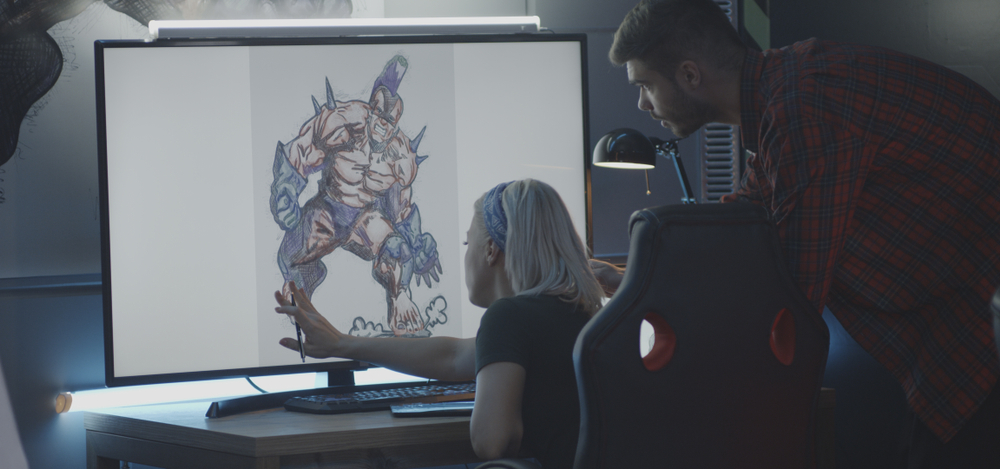Have you ever thought about becoming a video game designer, developing visual content for games? Are you interested in playing a part in plotting a video game’s storyline, shaping its characters, creating its dialogue, managing its look and sculpting its sound?
There is a team of people involved in the creation of video games and as a designer you will work closely with game artists, developers, writers, project managers, producers, sound engineers and QA testers to build a successful game. Video game designers work in many stages of the video game development process and their roles range from storyboarding, establishing the rules of the game, mapping out gameplay, testing the game, working out any bugs or issues with the code.
Below we take a look at some of the things you need to consider if you are serious about
Becoming a Video Game Designer
Start in school
You probably already have an interest in computers and gaming already if you have ever thought about becoming a video game designer. So it’s important to take every opportunity you can while you are in secondary school to gain a high level of computer literacy. Get involved in any computer clubs that your school runs or check out Coding & Game Design Camps that may be running in your area – these are great for teaching you to programme your own interactive stories, games and animations and start your video game designer career on the right foot!
Courses
There are a range of courses available for you to explore and take your skills to the next level and pursue your dream of becoming a video game designer. If you attain the results required for third level you can explore your options at degree level with a number of BA NFQ Level 7 courses out there that will prepare you for working in the computing industry – a typical degree course will include Programming, Software Development, Games Theory and Practice, Mathematics, Character Animation, UX Design, Database Systems, Game Engine Development, Algorithms and Data Structures.
If a degree course is not yet an option for you there are plenty of paths to take to get you where you want to go. You can look into NFQ Level 5 courses which will develop your fundamental digital and transferable skills to allow you to progress to further and higher education. These courses are great for improving key computing skills and games development techniques and prepare you to take the next step on your journey and to progress to further and higher education
Skills
As well as possessing the right technical skills there are a number of natural qualities that you will need to draw on as a good video game designer, such as a creative vision, a strong imagination, a flair for storytelling, being a good team member, having an analytical frame of mind, and having good time management and problem solving skills. Such an arsenal of skills will serve you well and propel you forward in the industry.
Get experience
Degrees in computer games development/design, graphic design, animation, software engineering or computer science are routes into the industry. However, it is also essential to have a certain amount of experience to break into the industry. While you are pursuing your studies it’s a great idea to keep an eye out for any internships and work experience that may be available in any area within the game development industry.
There may be openings for a junior designer or roles as a graphic designer, animator or software developer which will help you get games industry experience and advance your game design skills. It’s also a great way to work alongside an experienced team and learn from within the industry and network and begin relationships within the industry.
Build a portfolio
You should be building a portfolio of all your work both during your education years and working years.No matter what it is – anything related to the games industry that you’ve designed and visual or interactive assets you’ve built should be a part of your portfolio, demonstrating practical game design and development experience. From student projects to hobby-level game development, your portfolio not only works as examples of your work but also reflects the journey you are on and the passion you have.
Game on!
3rd Level and PLC courses in Computer Game Design are listed on Whichcollege.ie
Are you a computer games enthusiasts who is interested in pursuing a career in the computer games industry? We list courses in Computer Game Design on Whichcollege.ie
-
B.Sc. (Hons) Computing Science (Games Development)
Classroom Based, Computer Game Design Course by Griffith College Dublin (GCD) – Dublin City South, Co. DublinThis course has been finely tuned by the Faculty to deliver programmes that are not only academically strong but also reflect the needs of the computing industry.
-
Computer Games and Interactive Entertainment Development
Classroom Based, Computer Game Design Course by Ballyfermot College of Further Education – Ballyfermot, Co. Dublin
-
Computer Games Design (Creative Media)
Classroom Based, Computer Game Design Course by Kerry College of Further Education & Training – Tralee, Co. KerryExplore the possibilities in the ever-expanding games industry.
-
Game Design Higher National Diploma
Classroom Based, Computer Game Design Course by Ballyfermot College of Further Education – Ballyfermot, Co. DublinOur Game Design Higher National Diploma provides you with the skills required to turn your own pen & paper designs into fully-functional interactive products, using industry-standard tools, theory, and techniques. Use cutting-edge technology to bring your ideas to life. Then test them out online with the gaming community. Many of our graduates have gone on…
Further information
Irish Games Developers: www.gamedevelopers.ie
Ireland’s Annual Games Fleadh: www.gamesfleadh.ie
Irish Software Association: www.software.ie
Irish Computer Society: www.ics.ie












Comments